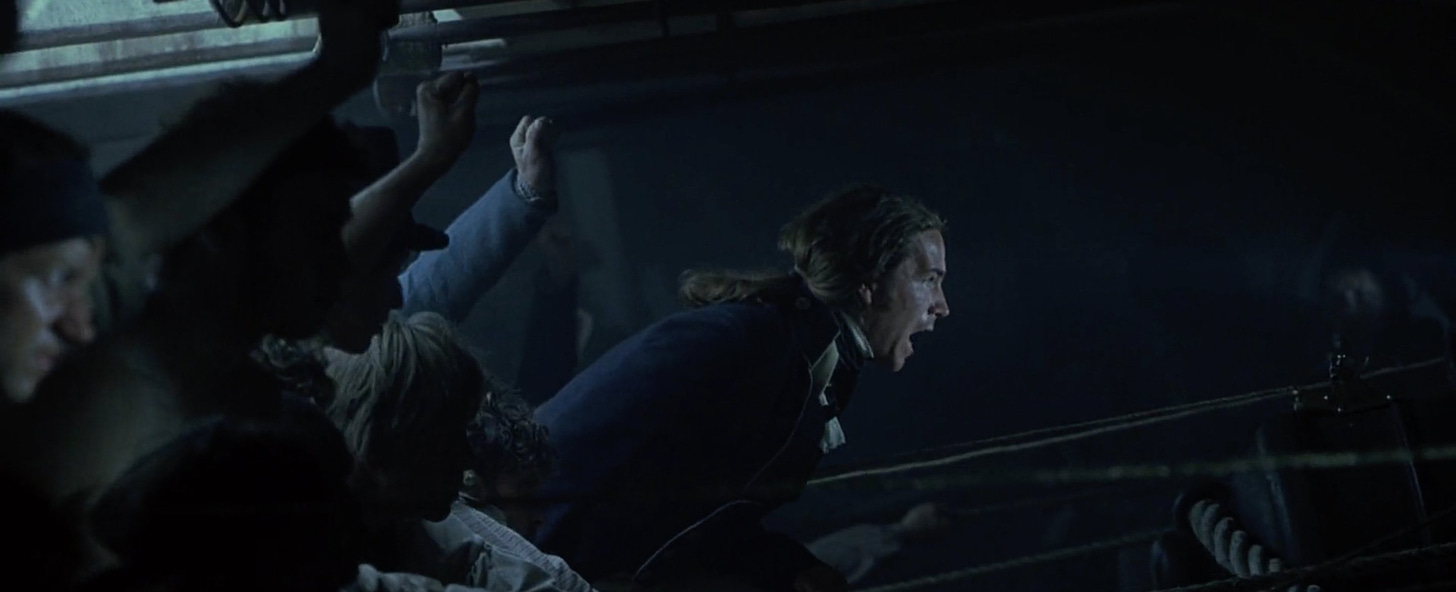100 Movies Every Catholic Should See #30: Master & Commander: Far Side of the World (2003)
Directed by Peter Weir
The year is 1806. The Napoleonic Wars are raging across Europe. In a distant corner of the globe, two ships plow through the seas, engaged in a deadly game of cat and mouse. The stage is set for Peter Weir’s thrilling nautical epic based on Patrick O'Brian’s acclaimed Aubrey–Maturin novels. Master and Commander: The Far Side of the World is a rare treat for modern audiences, delivering uncompromising historical accuracy in the spirit of the historical epics of old. Modern historical pieces, with all the costumes and sets in the world, often find themselves hamstrung by lackluster screenplays, chock full of anachronisms which pull the rug out from otherwise valiant efforts. Master and Commander’s dialogue is a historical education in itself, effectively characterizing how 19th century British seamen spoke about their world.
...Call her a frigate? Ha! You ask me she's no more a frigate than a painted Dutchman. More like a ship of the line, a two-decker more'n a frigate. She had the weather-gauge and long eighteens which could hit us beyond our effective range.
Quips the Lieutenant after the opening sequence’s surprise attack from the French ship Acheron. O'Brian’s mastery of nautical details is deftly preserved in the screenplay, fully immersing the audience in the age of sail and the worldview of the men living in it. The experience is enriched through masterful cinematography which captures the cramped experience of the 197 crew members on board through the deft utilization of blocking and framing while also paying homage to the great nautical paintings of the era.
Within this immersive historical framework, the drama of the narrative unfolds with a study on the nature of leadership through the eyes of Captain Jack Aubrey, portrayed to gritty and rugged perfection by Russel Crowe. Aubrey’s commitment to duty, tradition and the rule of law is counterbalanced by his dear friend, Dr. Stephen Maturin, who views power as a corruptive force and questions the rigid traditions Aubrey abides by in leading the ship. These opposing ideals often set these men at odds throughout the film, laying the groundwork for the drama of their friendship to unfold. These views collide in full force when one of the sailors fails to salute a ranking officer. In the royal navy, the punishment for such an offense is flogging. Aubrey immediately enacts an order for this punishment to be carried out. Maturin challenges him, alluding to the fact that such hierarchies of authority and arbitrary punishments are often the excuses of tyrants, calling to mind the likes of Nero and Napoleon. Leadership involves a constant confrontation with difficult courses of action. Aubrey understands the psychology of leading men and preserving order, even if it oftentimes involves choosing the harder course of action. “Men must be governed” he tells Maturin, “Often not wisely, I will grant you, but they must be governed nonetheless…. It's hard-work and firm discipline is what keeps our little wooden world together.” On the far side of the world, Aubrey’s commitment to order is paramount to the safety of the crew and success of their mission. However, such authority can be used in a corruptive way, especially when it masks pride. When the Acheron ambushes and cripples their ship, Aubrey throws caution to the wind, hellbent on pursuit, ultimately ordering his crew to head through a raging storm with all sails unfurled. The main mast snaps into the sea and a crew member is lost. As lightning flickers and thunder roars dramatically in Aburey’s cabin, Maturin calls out his friend,
You are not accustomed to defeat, Jack. That you have taken it too personally. That chasing this larger, faster ship, with its long guns, is beginning to smack of pride 'which goeth before destruction'?
Maturin is correct in his assessment of Aubrey’s actions. When authority is abused for the sake of pride or self gain it can be truly corruptive and damaging.
By the end of the film, both men learn to make compromises for the other as they learn to put aside their pride and full commitment to getting their way, showcasing that virtue truly lies in the mean of their opposing viewpoints. When Aubrey gives up the chase of the French ship for a respite on the Galapagos Islands to allow Maturin time to pursue his passion for naturalism, Maturin happens across the Acheron anchored in a hidden cove. He in turn gives up the rest of his studies to hurry back to the ship and alert Aubrey. Through self sacrifice and compromise, each man is able to help the other. It's a powerful depiction of the timeless interplay of true friendship, an element which enriches and elevates this seafaring epic from the arena of a simple action flick. This is perhaps best illustrated in one of the film’s most iconic scenes. As a full moon peers through the windows, Aubrey and Maturin pull out violin and cello to play a selection of chamber music in the candlelit captains’ cabin. It's an activity they often return to throughout the narrative. A musical duet is a dialogue in itself, a collaboration between differing parts. As the strains of Corelli’s Concerto grosso in G minor drift about the ship, the two men smile and enjoy a respite from the dangers and challenges of life at sea. Music, that universal force that helps men set aside their differences and come together in harmony, unifies the film at critical junctures. In the penultimate scene, there is a moving moment where the entire crew assembles on deck to bury the bodies of their fallen comrades to the sea. As Captain Aburey reads from the book of common prayer, the mournfully evocative Fantasia on a Theme of Thomas Tallis written by English composer Ralph Vaughan Williams based on a Tudor setting of the second psalm slowly envelops the gathering.
We therefore commit their bodies to the deep, looking for the resurrection of the body, when the sea shall give up her dead...
Much could be written on this excellent piece of cinema. Overshadowed in its 2003 release by The Lord of the Rings, The Return of the King, it has since grown in its much deserved appreciation. Master and Commander: The Far Side of the World resists the lure of modernist tropes, staying committed to accurately portraying the age of seafaring heroes through a timeliness tale of friendship and sacrifice. Historians, casual film-goers and Catholics alike will gain much in seeing this film.







I loved this movie. After a year or two of deciding not to watch even though my husband implored me to watch it. I saw a trailer and one of my least favorite actors (Paul Bettany) and said no. But, finally I gave in. All of the reviews said it was a treat. And BOY, was it ever! I totally recommend and I even half like Paul Bettany now. Do yourself a favor and rent or buy it!